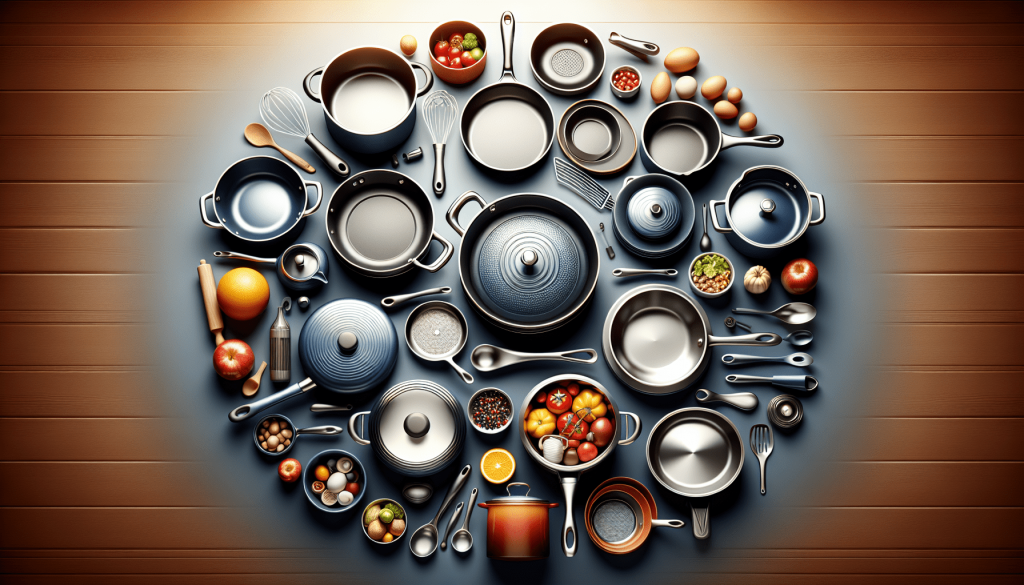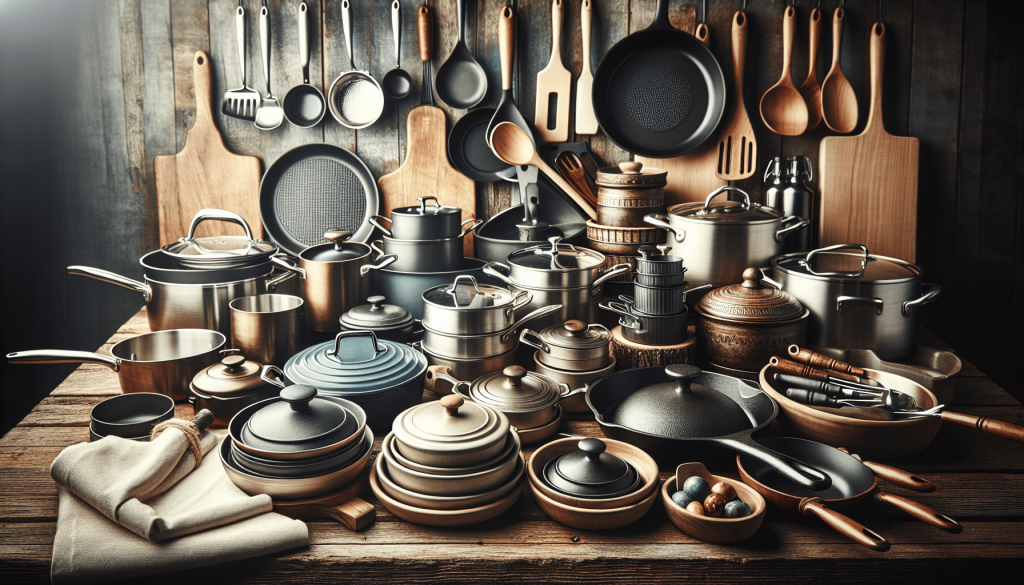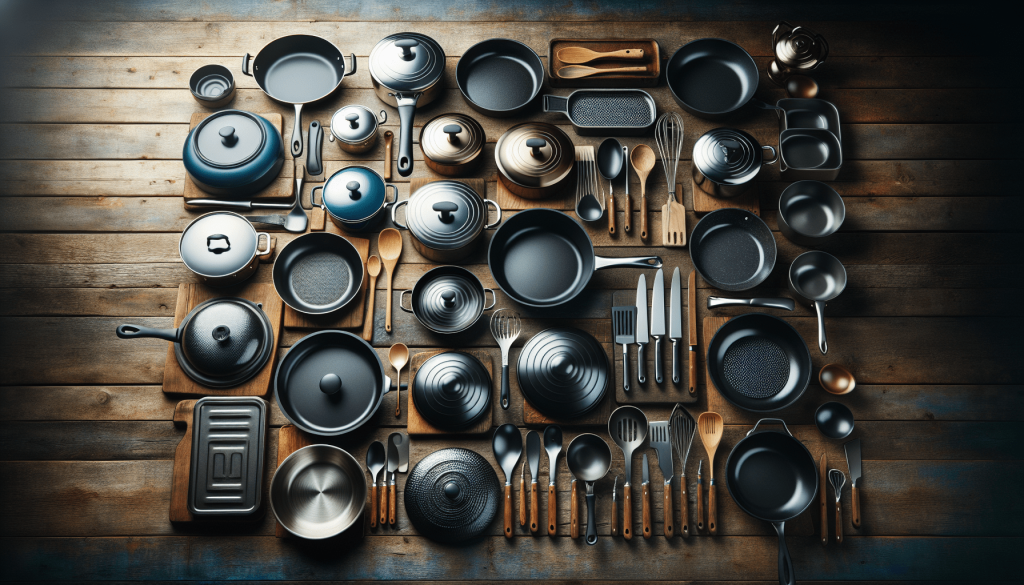Whether you’re a seasoned chef or a beginner in the kitchen, selecting the right cookware for your family’s needs can make a world of difference in your culinary adventures. With so many options available, it can be overwhelming to know where to start. But fear not! In this article, we will guide you through the process of selecting the perfect cookware for your family, taking into consideration factors such as material, durability, and budget. So get ready to upgrade your cooking game and create delicious meals that will leave your loved ones craving for more.
Considerations for Different Cookware Materials
When it comes to choosing the right cookware for your family’s needs, considering the different materials available is essential. Each material has its own advantages and disadvantages, and understanding these factors will help you make an informed decision.
Most Popular Cookware Materials
There are several popular cookware materials commonly found in kitchens today. These include non-stick coating, stainless steel, copper, and cast iron. Each material offers unique qualities that suit different cooking styles and preferences.

Pros and Cons of Different Cookware Materials
Let’s delve into the pros and cons of each cookware material to help you understand which one may be the best fit for your needs.
Non-Stick Coating
One of the main advantages of non-stick coated cookware is its ability to prevent food from sticking to the surface. This makes cooking and cleaning much easier. However, one drawback is that non-stick coatings can wear off over time, requiring replacement or re-coating. Additionally, some people have concerns about the chemicals used in non-stick coatings and their potential health risks.
Stainless Steel
Stainless steel cookware is renowned for its durability and resistance to corrosion. It is non-reactive, meaning it does not interact with acidic or alkaline ingredients. Stainless steel cookware is also easy to clean and maintain. However, it does not have the best heat conductivity, which may result in uneven cooking in some cases.
Copper
Copper cookware offers excellent heat conductivity, allowing for even heating and precise temperature control. It is also aesthetically pleasing and adds a touch of elegance to your kitchen. However, copper can be expensive and requires more maintenance than other materials. It is prone to tarnish and may react with certain acidic foods if not lined with another material.
Cast Iron
Cast iron cookware is known for its exceptional heat retention and distribution properties. It is incredibly durable and can withstand high temperatures, making it perfect for searing and slow cooking. On the downside, it requires regular seasoning to maintain its non-stick properties and prevent rust. Cast iron can also be heavy and may take longer to heat up compared to other materials.
Understanding Heat Conductivity
Heat conductivity is an important factor to consider when choosing cookware. It refers to how well and evenly the cookware distributes heat.
Cookware with High Heat Conductivity
Materials such as copper and aluminum have high heat conductivity, meaning they heat up quickly and distribute heat evenly. This is particularly advantageous when precise temperature control is essential, like when making delicate sauces or simmering soups.
Cookware with Low Heat Conductivity
Materials such as stainless steel and cast iron have lower heat conductivity. While they may take longer to heat up, they retain heat well once hot. This can be advantageous for certain cooking techniques that require even, sustained heat, such as searing meat or baking.

Factors Affecting Cookware Durability
Durability is crucial when investing in cookware that will withstand the test of time.
Long-lasting Materials
Stainless steel, cast iron, and copper are known for their durability. When properly cared for, these materials can last for many years, resulting in a worthwhile investment.
Flimsy Materials to Avoid
Some cookware materials may be flimsy and prone to warping or breaking under high heat. It is best to avoid materials that may compromise the longevity and performance of your cookware. Cheaply made or thin materials may not stand up to regular use and could be a waste of money in the long run.
Ease of Cleaning
Considering the ease of cleaning your cookware is essential for maintaining its lifespan and ensuring food safety.
Dishwasher Safe
Some cookware materials, such as stainless steel and certain non-stick coatings, are dishwasher safe. This can be a significant time saver and make clean-up a breeze. However, it is important to note that handwashing is often recommended for certain materials to preserve their quality and lifespan.
Special Cleaning Requirements
Certain cookware materials, like copper and cast iron, may require specific cleaning methods to maintain their appearance and effectiveness. For example, copper may need to be polished to remove tarnish, while cast iron may require proper seasoning after each use.

Compatibility with Different Cooking Methods
Consider whether the cookware material is suitable for your preferred cooking methods.
Versatility in the Kitchen
Some cookware materials, such as stainless steel and cast iron, are highly versatile and can be used for a wide range of cooking methods, from sautéing and frying to baking and roasting. This versatility allows you to expand your culinary horizons and try new recipes with ease.
Specialized Cookware for Specific Dishes
Certain dishes may require specialized cookware. For example, copper cookware is often preferred for making delicate sauces, while non-stick pans are popular for cooking eggs and pancakes without sticking. Consider your cooking preferences and the types of dishes you frequently prepare when choosing the right cookware.
Considerations for Family Size
When choosing cookware, it’s essential to consider your family size and the quantity of food you typically cook.
Cookware Capacity for Different Needs
Large families may require larger pots and pans to accommodate larger portions. Alternatively, smaller families or individuals may prefer smaller cookware options to prevent excessive waste and conserve space. Consider your family’s needs and the amount of food you typically cook to choose the right cookware size and capacity.
Budget Considerations
Cookware comes in a wide range of price points, and it’s important to consider your budget when making a purchase.
Finding the Right Value
While investing in high-quality, durable cookware may require a higher upfront cost, it often pays off in the long run. Finding the right balance between quality and affordability is essential. Consider your cooking needs, budget, and desired lifespan of the cookware when choosing the right materials and brands.
Non-Toxic Materials
The safety of your cookware and the potential health risks associated with certain materials should never be overlooked.
Avoiding Harmful Chemicals
Some non-stick coatings may contain chemicals like perfluorooctanoic acid (PFOA) or polytetrafluoroethylene (PTFE), which can be released when overheated or damaged. Opting for cookware with non-toxic coatings and avoiding materials that may leach harmful substances into your food is crucial for maintaining a healthy kitchen.
Safety Features to Look For
When considering the safety of your cookware, look for features such as heat-resistant handles, secure lids, and non-slip surfaces. These features can help prevent accidents and injuries during cooking.
Reputable Brands
Choosing cookware from reputable brands can provide peace of mind knowing that you are purchasing a quality product.
Warranty and Customer Support
Ensure that the cookware you choose comes with a warranty, as this demonstrates the manufacturer’s confidence in their product. Additionally, researching customer reviews and the brand’s reputation for customer support can help you make an informed decision.
In conclusion, choosing the right cookware for your family’s needs involves considering the material, heat conductivity, durability, maintenance requirements, compatibility with different cooking methods, size and capacity, price range, health and safety considerations, and the brand’s reputation and warranty. Taking these factors into account will help you select cookware that enhances your cooking experience, lasts for years, and ensures the health and safety of your family. Happy cooking!
